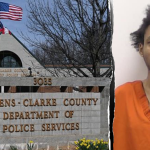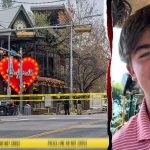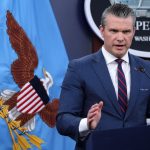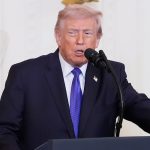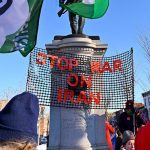GLENDALE, ARIZONA — The memorial for conservative activist Charlie Kirk, fatally shot at a Utah university earlier this month, opened with emotional speeches that blended grief, gratitude, and faith.
Pastor Rob McCoy, Kirk’s longtime pastor, began by thanking Turning Point USA staff for staging the organization’s largest-ever event and assuring the crowd it was “alive and well.”
McCoy said others would recount Kirk’s accomplishments, but as his pastor, his role was to explain “the why in what he did.” He declared that Kirk wanted Jesus to be the “guest of honor,” describing Christ as “the king of glory, the prince of peace, the savior of the world … the total embodiment of love, the total embodiment of truth.” He reminded the crowd that Kirk committed his life to Jesus at an early age, believed salvation came only through Christ’s sacrifice, and lived without fear, knowing his life was secure in God’s hands.
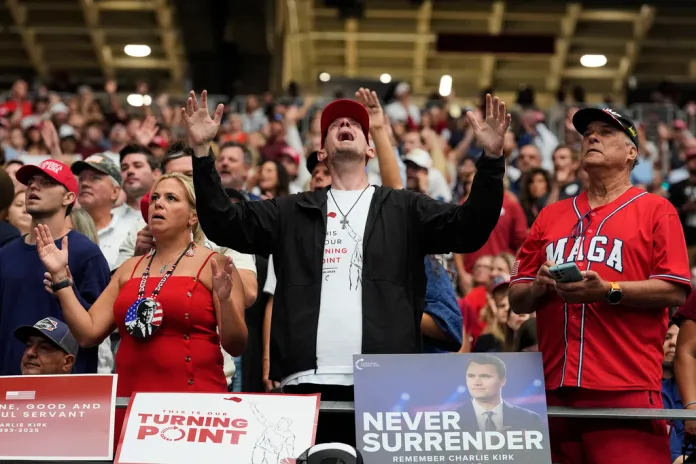
The memorial opened with a Christian band leading the stadium in worship, the sound of tens of thousands singing familiar hymns filling the air. It was a striking contrast to the atmosphere of a Trump rally, where patriotic staples and pop anthems like “Y.M.C.A.” usually set the tone. Here, the music underscored the service’s blend of faith and politics, with the crowd at times singing a cappella, their voices echoing through the arena.
POLITICAL VIOLENCE ON THE RISE IN THE US: A TIMELINE OF KEY INCIDENTS
Mikey McCoy, son of Rob McCoy, recalled the life-changing moment he first met Kirk while driving him and his then-girlfriend, Erika, to the airport. “The entire car ride, he was grilling me on Aristotle, Socrates, Plato, American history. At the end, he said, ‘Don’t go to college, come work for me.’ Instead, at 18, I canceled my college plans, moved to Arizona. My life was forever changed by Charlie.”
He described how working at Turning Point USA even led him to meet his wife, Elizabeth, whom Kirk had once interviewed on his podcast: “Elizabeth and I were married a year later. Thank you, Charlie.”
Mikey McCoy’s voice grew heavier as he reflected on Kirk’s death. “Eleven days ago, my friend was martyred for using his voice to engage in peaceful dialogue. Charlie’s assassin thought he could steal and silence his voice by putting a bullet in his neck. In the words of Søren Kierkegaard, ‘The tyrant dies and his rule is over. The martyr dies and his rule has just begun.’” He vowed Kirk’s movement would only grow stronger: “We won’t cower in fear. We will never surrender. We are resolved to live free from lies and seek out what is true.”
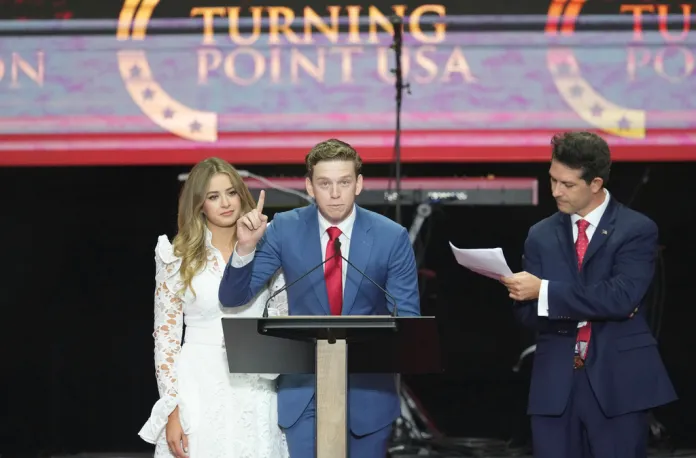
After his emotional tribute, the program turned to Tyler Bowyer, one of Kirk’s closest colleagues and the longest-serving employee at Turning Point USA. Bowyer, now CEO of Turning Point Action, introduced himself as both a co-worker and a friend who had been with Kirk since the organization’s earliest days.
“I met my friend Charlie in 2014 when Turning Point USA was just in its infancy,” he recalled. “We went to work every day on a 24-hour clock. Between me and him, we were a team that was never off the clock, full coverage.” He described their routine of working late into the night, sending updates and waiting for Kirk’s first replies in the morning, “a flurry of brilliant Charlie Kirk ideas as soon as he opened his eyes.”
OPINION: CHARLIE KIRK’S HONORABLE LEGACY OF CIVIL DISCOURSE
Bowyer credited those early years of constant brainstorming and hustle with laying the foundation for Turning Point USA’s growth into a national conservative powerhouse. He also spoke more personally, recalling the honor of toasting at Kirk’s wedding to Erika, a relationship that began after she was recruited to work at Turning Point USA. “I lost an employee,” he joked, “but now she’s my boss.” Watching their marriage and family grow alongside the organization, he said, was one of the great privileges of his life.
After Bowyer, Andrew Kolvet, Turning Point USA spokesman, business partner, and executive producer of The Charlie Kirk Show, took the stage.
“Charlie and I built the show over eight years, brick by brick,” he said, praising the producers, editors, and social media team who made it possible. Continuing the podcast after Kirk’s death had been “excruciating,” Kolvet admitted, but “we knew it’s exactly what Charlie would want.”
Despite Kirk’s packed schedule, Kolvet said the daily show was his “favorite part of the routine,” and he read every listener email. “It’s truly remarkable,” he said. “At the end of every show, I’d check the sent folder and find six or seven email chains with someone who disagreed.”
Kolvet told the crowd Kirk’s audience was his anchor: “You were his firewall for freedom. You were his North Star. When he met fancy elites who tried to take him off course, he knew better, because he knew all of you.”
He concluded, “Charlie Kirk was a prophet, not the fortune-telling kind but the biblical kind. He confronted evil, proclaimed the truth, and called us to repent and be saved. He wasn’t mean about it. He was kind, he was loving, and he desperately wanted the best for all of us.”
Also taking the stage was Benny Johnson, a right-wing podcaster with more than 5 million subscribers on YouTube. Just a day earlier, his program opened with a dramatic montage of fighters in body armor wielding guns and swords under the title “American Martyr: How Christians Should Avenge Charlie Kirk’s Death: ‘Nationwide Revival.’”
At the memorial, Johnson declared that Kirk’s assassination had triggered a “thermonuclear spiritual war.” He turned to scripture, quoting the New Testament: “Do you want to be free from the fear of authority? Then do what is right, and you will be commended … for the rulers do not bear the sword in vain.”
Frank Turek, a Christian apologist and longtime mentor to Kirk, offered one of the most emotional recollections of the day of the shooting itself. Turek had been with Kirk on Sept. 10 at Utah Valley University and described the chaos that followed when the gunman opened fire.
“When that shot rang out, I took a step toward him, but his security team was on him immediately,” Turek said. He rushed with them to the SUV as Kirk’s team tried desperately to save his life. “We did everything we could, but Charlie was gone.”
Turek said Kirk’s final moments gave him peace. “His face was looking at mine, but he wasn’t looking at me. He was looking past me, right into eternity. If it’s any comfort at all, I learned later that Charlie felt no pain. He died instantly.”
He told the crowd that Kirk’s place in heaven was not because of his accomplishments or sacrifices but because of his faith. “Charlie Kirk is in heaven not because he was a great husband and father, not because he saved millions of kids out of darkness on college campuses, not because he changed minds or sacrificed himself for his savior. Charlie is in heaven because his savior sacrificed himself for Charlie Kirk.”
The service took on a sharper political edge with remarks from Stephen Miller, the White House deputy chief of staff.
Casting Kirk’s death as a rallying cry, Miller told the crowd, “You thought you could kill Charlie Kirk. You have immortalized Charlie Kirk, and now millions will carry on his legacy. You cannot defeat us. You cannot slow us. You cannot stop us. You cannot deter us.”
He warned that the assassination had awakened what he described as a “dragon” of renewed determination to defend Western civilization.
Miller also had a strong message to opponents. “You have nothing to give. You have nothing to offer. You have nothing to share but bitterness. We have beauty, we have light. We have goodness. We have determination. We have vision, we have strength.”
Susie Wiles, Trump’s White House chief of staff, followed by crediting Kirk with helping mobilize young voters.
“His life, his words, his courage to speak the truth about God, family, and country built the most powerful youth movement in our time,” she said.
Wiles also urged mourners to carry on his work. “Let us honor Charlie in the best way possible, by continuing his mission loudly and proudly, and by making sure this generation knows this movement is their home.”
Tulsi Gabbard, the director of national intelligence, used her remarks to frame Kirk’s legacy around free expression.
“Free speech is the foundation of our democratic republic,” she said. “I may not agree with what you say, but I will fight to the death for your right to speak. Without it, we’ll be lost. Charlie knew this. He lived it.”
She described Kirk’s words as his weapons, rooted in love for God, others, and country, that “slayed ignorance” and “cut through lies.” Gabbard recalled sitting with him at Arizona State University last year, watching his calm courage as he welcomed even his fiercest critics to debate.
“He wanted people to know the truth, because it’s the truth that sets us free. It is the truth that keeps us free,” she said.
Gabbard argued that Kirk chose schools as his arena because they should foster critical thinking and open debate, even as, in her view, too many now silence dissent.
“Charlie showed respect and compassion for everyone, even those who opposed him,” she said. “He invited them to his table, or on his show, saying, ‘Let’s talk.’
Secretary of State Marco Rubio followed, recalling the skepticism he once had when first told about Kirk’s plans to take his message onto college campuses. Over the years, Rubio said, Kirk proved him wrong, sparking what he called a renaissance that pushed back against narratives portraying America as evil or broken. Kirk reminded young people, Rubio said, that marriage and family are noble callings and that the United States is “the greatest, most exceptional nation that has ever existed.”
Rubio praised Kirk’s breadth of knowledge and unusual wisdom for his age, recalling a recent message Kirk sent him from South Korea just days before his death. More than knowledge, Rubio said, Kirk possessed courage, choosing to engage those who disagreed with him rather than retreat into isolation. He pointed to reports that Kirk had even invited a CNN host to dialogue just before his assassination as evidence of that spirit.
Looking around at the massive turnout, the cabinet secretary said the scale of the memorial and the global condolences underscored how impactful Kirk had been in just 31 years. Rubio closed on a spiritual note, stressing Kirk’s conviction that every person is created by God for eternal purpose, and urged mourners to honor him by carrying forward that belief.
Secretary of War Pete Hegseth delivered one of the most forceful tributes, casting Kirk as more than a political organizer.
“Charlie Kirk was a patriot, a conservative, a leader, a builder, an advocate, an author, a lover of freedom, a husband, a father, a Christian, and a warrior,” he said.
Hegseth argued that while Kirk championed “America First” politics, he ultimately saw the fight as spiritual rather than political. “Only Christ is King,” Hegseth declared, stressing Kirk’s conviction that faith and family were the true foundations of freedom.
Hegseth recalled meeting Kirk more than a decade ago, when he was building Turning Point USA on a simple rallying cry: “Big Government Sucks.” But over time, he said, Kirk recognized that the struggle was larger than politics or culture, it was a spiritual war.
“Charlie had big plans, but God had even bigger plans,” Hegseth said, calling Kirk’s death a moment that had sparked “a turning point for the USA.”
He likened the day’s gathering to “Charlie’s church,” saying Kirk had started a political movement but unleashed a spiritual revival. His pastor, Hegseth noted, told him after the shooting that “the devil overplayed his hand.” Kirk may have begun with liberty, he said, but he ended by lighting “our country on fire for Christ.”
“Charlie waged war not with a weapon, but with a tent, a microphone, his mind, and the truth,” Hegseth concluded. “And the gates of hell could not prevail against him.”
Secretary of Health and Human Services Robert F. Kennedy Jr. followed with a more reflective address, urging mourners to see Kirk’s life as a call to deeper faith and dialogue. “We should turn every day and every moment, every interaction, into prayer,” Kennedy said, adding that Kirk understood a paradox: “Only in surrendering to God can his power flow into our lives and make us fully human.”
Kennedy drew a parallel between Christ’s death at 33 and Kirk’s at 31, saying both lives altered the course of history because of their surrender to God. He praised Kirk’s defense of free speech, calling it “the soil, the water, the sunlight for democracy.” Kirk, he said, believed democracy’s strength was rooted in ideas tested in the marketplace of conversation.
Kennedy warned that modern technology and social media algorithms exploit human impulses toward tribalism and division, but said Kirk saw the antidote in “a spiritual fire” and the building of true community. “The only way to develop community was through conversation,” Kennedy explained, noting that Kirk often gave “the biggest microphone to the people most passionately opposed to him” because he believed dialogue was essential to healing division.
Donald Trump Jr., the president’s son and one of Kirk’s close friends, recalled the risks Kirk was willing to take from the very beginning. “Charlie always brought out the best in all of us,” he said. Trump Jr. remembered Kirk’s push during the 2016 campaign to take conservative ideas onto college campuses, a plan he initially dismissed.
“I was like, whoa. Seriously. Come on, man, we’ve given up on that. We’ll get those kids when they start paying taxes,” he joked. “But Charlie convinced me to give it a shot.”
He recounted moments when that decision tested their courage, including an event at Michigan State where police warned they could no longer guarantee their safety.
TURNING POINT’S ERIKA KIRK TURNS GRIEF TO MOBILIZATION FOR YOUNG CONSERVATIVE WOMEN
“That sounded like a great reason to pack it up and head out,” Trump Jr. admitted, “but Charlie said, ‘No way. We’re going out there, anyway.’” The same thing happened during the 2024 campaign at Arizona State, he added, when another threat emerged just before they were to take the stage. “Again, we went out there anyway, without fear, Charlie led the way.”
Trump Jr. said Kirk’s courage in those moments embodied his lasting message. “His message was clear then, and his message is clear now: We won’t back down. We won’t be intimidated.”

